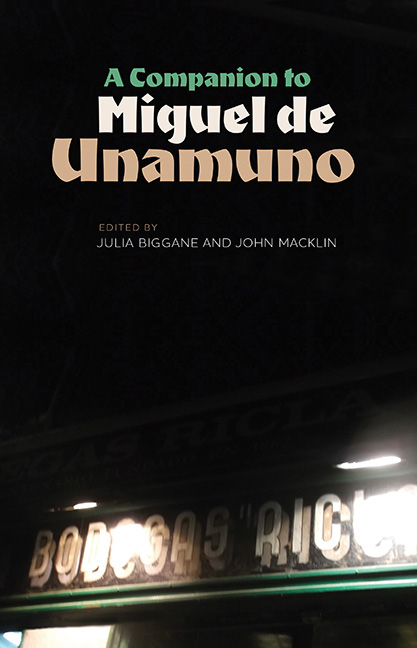1 - Unamuno before 1902: Writing Nation, History, Politics*
Published online by Cambridge University Press: 21 May 2021
Summary
Unamuno's thought and writing underwent considerable change between the late 1880s and the early 1900s; at the same time, some elements of his youthful intellectual production remained constant throughout his life. This chapter traces the lines of evolution and continuity in his early work, from an initial preoccupation with Basque identity and culture, through an extended examination of Spanishness, Spain's history, and its relationship with Europe, to the beginnings of his ‘intimate dramas’—literary texts unconcerned with place or nation.
From Romantic Foralism in Bilbao to Positivism in Madrid
On 21 July 1876, a political event took place that had immensely significant consequences for the Basque provinces: the prime minister, Antonio Cánovas del Castillo, announced the abolition of the Basque fueros or customary laws. It could not have left indifferent the young Miguel de Unamuno, who had just finished the first year of his baccalaureate studies. Reading the Catalan federalist and libertarian socialist Francisco Pi y Margall's Las nacionalidades [Nationalities] a few months after the fueros were abolished made a huge impact on the young Miguel. His romantic interest in the question of nationhood, fed by ancient Basque legends, found an echo and a doctrinal base in Margall's nationalism, whose ideology derived in part from Pierre-Joseph Proudhon. Unamuno later commented that he and his friends regarded Pi y Margall's book as a kind of holy scripture when they gathered regularly to discuss federalism. Their discussions took place:
‘always with a view to the redemption of our Basque lands […] which we thought of as another Ireland, Hungary or Poland. Because at that time, for us boys in 1879, these three countries were models of political slavery’
(OCE VIII, 340; OCA X, 305).On 27 December 1879, shortly before he left the Basque country to begin his university studies in Madrid, Unamuno published his first article, anonymously, in the Noticiero Bilbaíno. Entitled ‘Strength through Union’, the fifteen-year-old Unamuno expressed a political desire shared by many: the grouping of Basque parties into a Basque-Navarrese Union, concerned exclusively with overturning what they saw as the abusive 1876 law.
- Type
- Chapter
- Information
- A Companion to Miguel de Unamuno , pp. 7 - 28Publisher: Boydell & BrewerPrint publication year: 2016



